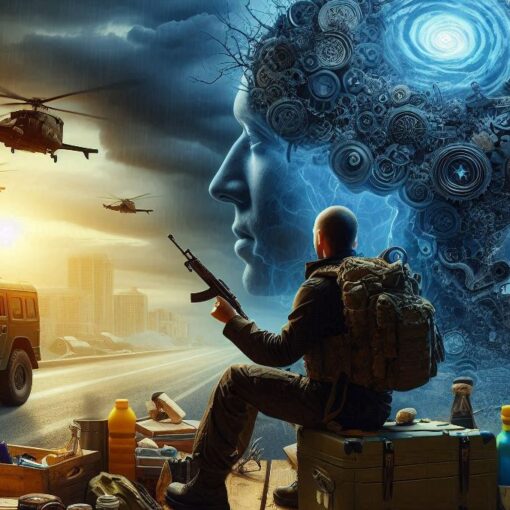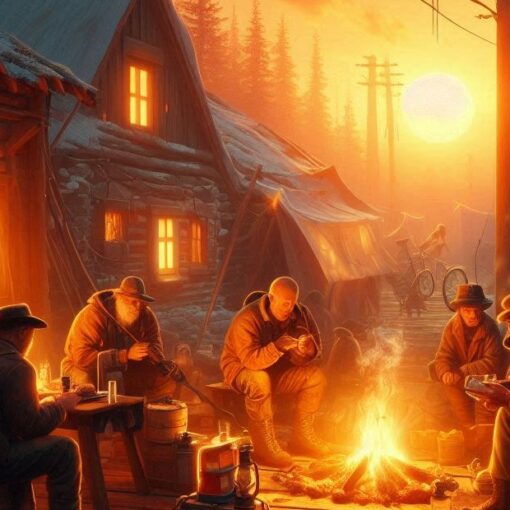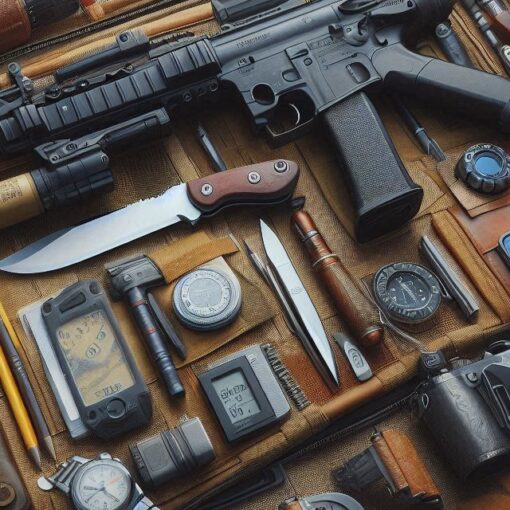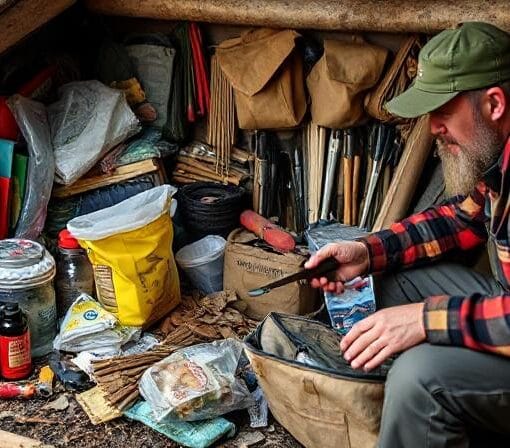Top Takeaways and Key Concepts
- Store emergency water and food now so you’re not scrambling during a crisis.
- Build a compact survival kit with a flashlight, first aid, multitool, and phone charger.
- Know your neighborhood resources like shelters, safe spots, and escape routes.
- Use water filters or boiling to purify unsafe water during emergencies.
- Stay informed during disasters with radios and backup communication like two-way radios.
Summary of This Article
This article explains how city dwellers can prepare for emergencies by building a lightweight but effective survival plan. It stresses the importance of storing clean water and non-perishable foods, along with essential tools like flashlights, batteries, and first aid supplies. It encourages people to learn their neighborhood layout—including shelters and safe spots—and adopt an urban prepper mindset focused on readiness rather than fear. The article also covers smart ways to store food, purify water, and stay connected when cell service goes down. With organization, creativity, and a little humor, anyone can be prepared to handle city chaos confidently.
Short Video Version of this Article
Living in a city is quite the adventure, isn’t it? You’ve got rush hour traffic that feels like a never-ending puzzle, expensive coffee that sometimes tastes like magic, and those lovely smells wafting in from the garbage. Ah, city life!
Please Note: This post may contain affiliate links. If you click one of them, we may receive a commission at no extra cost to you. As an Amazon Associate, I earn from qualifying purchases.
But what if things go sideways? We need to be ready for all sorts of surprises. A big storm could come out of nowhere. Or maybe you’re worried about something crazier, like a zombie apocalypse. I mean, who hasn’t thought about that at least once?
Grab your favorite snack! Something easy to munch on—no cooking needed. Let’s dive into what every city dweller should have on hand just in case.
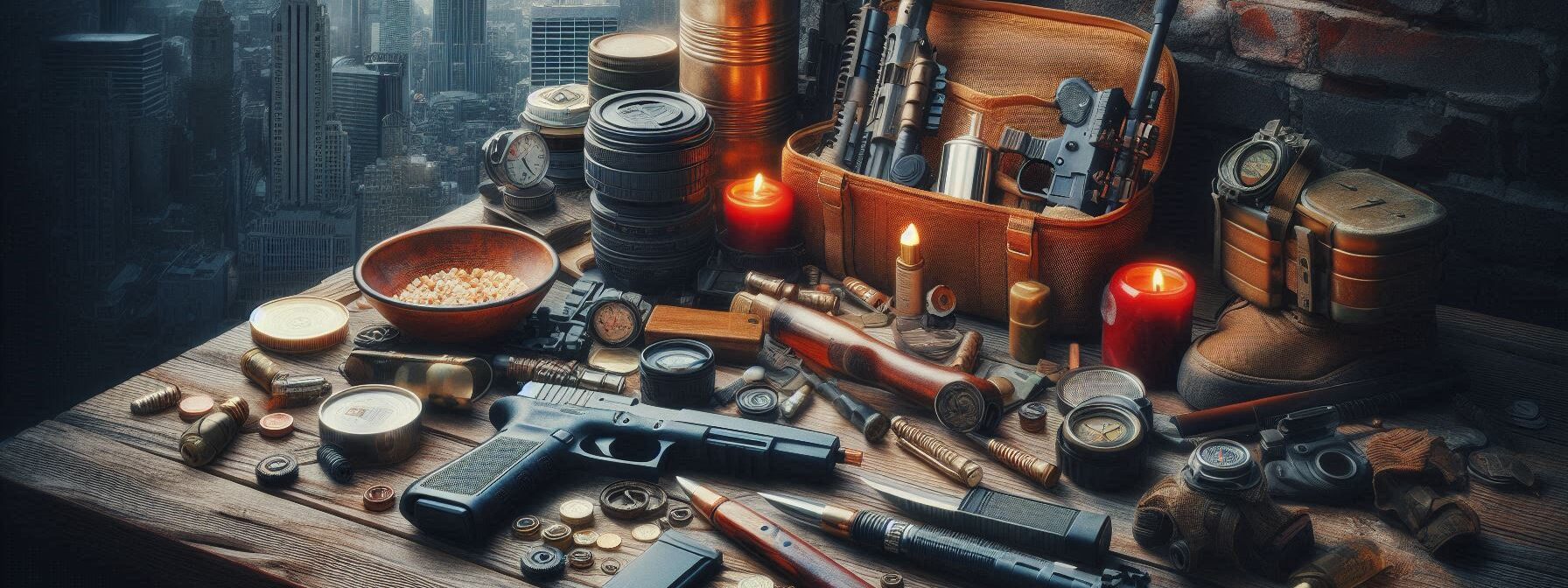
First off, think about water. Bottled water is key! You can’t live without it. Stashing a few extra bottles under your bed or in a closet is smart.
Next up, non-perishable food. Think granola bars, nuts, or canned goods. They last forever and are super easy to eat when you’re hungry but don’t feel like cooking.
A flashlight is also a must-have! When the lights go out, you’ll want something to light up your way. Don’t forget extra batteries too!
It’s also vital to have some basic first aid materials. You can use band-aids and antibacterial wipes to help with small accidents.
And don’t forget to keep critical paperwork safe, such insurance papers and IDs. It makes logical to put them in a bag that won’t get wet.
It may sound stupid now, but being ready for these things can make you feel safer when things go crazy. Let’s get ready together! It will make us feel better while we have fun in the city!
The Urban Prepper Mindset

First things first: being an urban prepper isn’t just about stockpiling canned beans and bottled water. It’s a mindset! Think of yourself as a survivalist with Wi-Fi access. You might not be living in the woods, but you’re still surrounded by challenges that can turn your concrete paradise into chaos faster than you can say “Where’s my phone charger?”
Living in a city is pretty awesome, right? So many pizza places to choose from! But then there are those moments when things get a little scary. Picture this: you’re stuck in your apartment during an emergency, and all you’ve got is a half-eaten bag of chips and three mismatched socks. Not the best situation!
That’s why having the right survival gear is super important. You never know when you might need it.
Getting to know your neighborhood can really help too. Check out nearby parks where you could go if things get wild. They might be good spots to escape to for some fresh air or even just a quiet place to think.
Local shelters are also worth knowing about. If snacks run low, you’ll want somewhere safe to go. It’s funny how something as simple as knowing where the nearest shelter is can make such a big difference.
And hey, while you’re at it, remember that pizza place down the street? Knowing where to find food can be lifesaving too!
Take a walk around your area sometime. Look for safe spots and gather info on resources nearby. It’s like being a little urban explorer! You’ll feel more prepared and ready for anything life throws your way—pizza included!
Must-Have Gear for City Survival

Now let’s talk gear! What do you really need to survive in an urban environment? First on my list is a good backpack—something sturdy enough to carry supplies but stylish enough so people don’t think you just escaped from summer camp.
In this bag, pack essential items like first aid kits (because who knows when you’ll trip over someone else’s shoelaces?), flashlights (for those late-night power outages), and multitools (because sometimes you need both scissors and a bottle opener at 2 AM). Don’t forget extra batteries; they’re as vital as coffee on Monday mornings!
Also, consider including portable phone chargers because let’s be honest—how will you post about your survival adventures on social media without battery life? That would be tragic!
Food Storage Solutions

When it comes to food storage in an apartment setting, think compact and clever! Canned goods are fantastic but remember that they take up space—a lot of space if you’re planning for any type of long-term emergency.
Oh man, I remember this one time. I thought it’d be super smart to fit three months’ worth of canned chili into my pantry. Sounds like a plan, right? Well, let me tell you, I ended up creating a new game called “Can Tetris.” Spoiler alert: I lost miserably! Cans were everywhere.
Instead of going for cans that take up so much space, think about freeze-dried meals or vacuum-sealed packs. They’re light and easy to stash under beds or in closets. No one wants their home looking like an episode of “Hoarders,” trust me.
And snacks! Oh boy, don’t forget the snacks! When things get tough, having comfort food is super important. It really helps keep your spirits up. Pack some chocolate bars or granola bars—something sweet and yummy. You’ll totally thank me later when stress eating kicks in.
Imagine munching on a chocolate bar while everything feels chaotic around you. It’s like a little hug for your tummy! So, stock up on those treats along with your meals. You’ll feel more prepared and maybe even a bit cozy when you need it most.
Water Purification Techniques

Water is life, especially when you’re sweating through another muggy city summer day or trying not to die from dehydration during an unexpected crisis. The problem is that tap water may not always be safe after disasters hit.
Investing in portable water filters can make all the difference between sipping clean water or tasting something reminiscent of swimming pool chemicals. Honestly, nobody wants that!
Okay, let’s speak about how to boil water. You really need to know how to accomplish this if nothing else works. It saves lives! Even if it’s only using the stove till the gas runs out. Just think about it: you’re cooking coffee or soup. Yummy!
Don’t forget to store some extra water, by the way. You can do it with empty Coke bottles. They do a great job! First, make sure you clear them out. And hey, don’t use them again for soda unless you want surprises! Imagine taking a sip and getting… ugh, the taste of old soda instead of fresh water. Not pleasant.
It’s really vital to keep water. You never know when you’ll need it, like when there’s a heatwave or an emergency. So go ahead and fill those bottles! Having enough water makes things seem a little less stressful.
And don’t forget that boiling water can help you clean things as well as cook. When things go tough, it’s like having a little magic in your kitchen.
Staying Informed During Emergencies
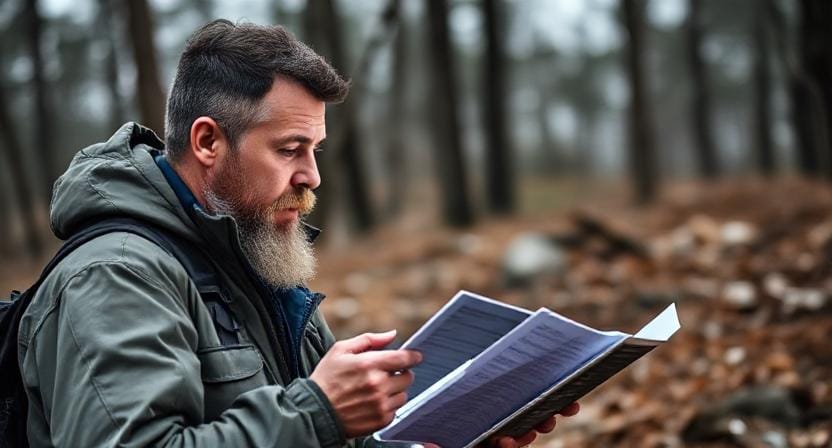
Okay folks, here comes one last critical point: communication is key during emergencies! While most people rely on their smartphones like they’re lifelines sent directly from heaven above (and they kind of are), what happens when service goes down?
Consider investing in two-way radios—they’re like walkie-talkies but cooler because they make you feel like you’re part of a secret mission team. Plus, having backup communication methods ensures that even if cell towers collapse faster than my New Year resolutions do each year, you’ll still have ways to check on loved ones or coordinate plans.
And don’t forget about local news sources; keep updated via battery-powered radios whenever possible—or better yet—learn how to read maps instead of relying solely on GPS apps!
Conclusion: Embrace Your Inner Urban Survivor
Okay, so here’s the thing. Urban prep isn’t just about hoarding supplies like some survival show contestant. It’s also about being smart and a little creative. Seriously, think outside the box!
You can make a plan for emergencies without going crazy. Like, maybe you set up a fun spot in your living room with snacks and games for those unexpected days when everything goes haywire. And let’s be real—keeping a sense of humor is key!
Life throws all sorts of surprises at us. Natural disasters? Ugh, annoying construction noises at 6 AM? Totally frustrating! But if we’re ready, it feels less scary. Imagine dealing with chaos while munching on chocolate. Sounds good, right?
Being prepared doesn’t mean being serious all the time. Laughing helps ease the stress. So grab your favorite snack, gather your supplies, and remember to smile through it all! You got this!
Frequently Asked Questions
1. What are the most important supplies to store for urban emergencies?
The most essential items are clean water, non-perishable food, a flashlight with batteries, a basic first aid kit, and important documents. These essentials help cover basic survival needs if services are disrupted.
2. How much water should I store and why is it so important?
You should store at least one gallon of water per person per day for emergencies. Water is needed not only for drinking but also for hygiene and cooking when tap water may be unavailable or unsafe.
3. What should I keep in my urban survival kit?
A smart survival kit includes a sturdy backpack, flashlight, batteries, portable phone charger, multitool, bandages, antiseptic wipes, and any personal medications. These allow you to handle common emergency situations quickly.
4. How do I store food in a small apartment without clutter?
Use compact options like freeze-dried meals, vacuum-sealed snacks, and lightweight canned goods. Store them under beds, in closets, or in plastic bins to maximize space while keeping everything organized.
5. What’s the best way to purify water if the tap becomes unsafe?
You can purify water by boiling it, using portable water filters, or adding purification tablets. These methods remove harmful bacteria and make water safe to drink during emergencies.
6. How can I stay informed if the power or cell service goes out?
Keep a battery-powered or hand-crank emergency radio and consider two-way radios for communication with family. These tools work even when mobile networks or power grids fail.
7. Why is knowing my neighborhood important for survival?
Understanding your area helps you find safe zones, shelters, hospitals, and alternate routes. This knowledge keeps you calm and confident when you need to act quickly during a crisis.
Suggested Resources:
Urban Survival Guide
https://www.survivalresources.com/urban-survival-guide
Emergency Preparedness Tips
https://www.ready.gov/emergency-preparedness-tips
How To Create a Bug Out Bag
https://www.thebugoutbagguide.com/how-to-create-a-bug-out-bag

Kevin Collier is a seasoned outdoor enthusiast and writer for Trekbug.com, specializing in outdoor adventures, survival strategies, and prepping insights. With a deep love for nature and a commitment to self-sufficiency, Kevin empowers readers to embrace the wilderness confidently. He shares valuable tips, practical techniques, and inspiring stories, helping both novice and experienced adventurers develop essential skills for surviving and thriving in the great outdoors.


